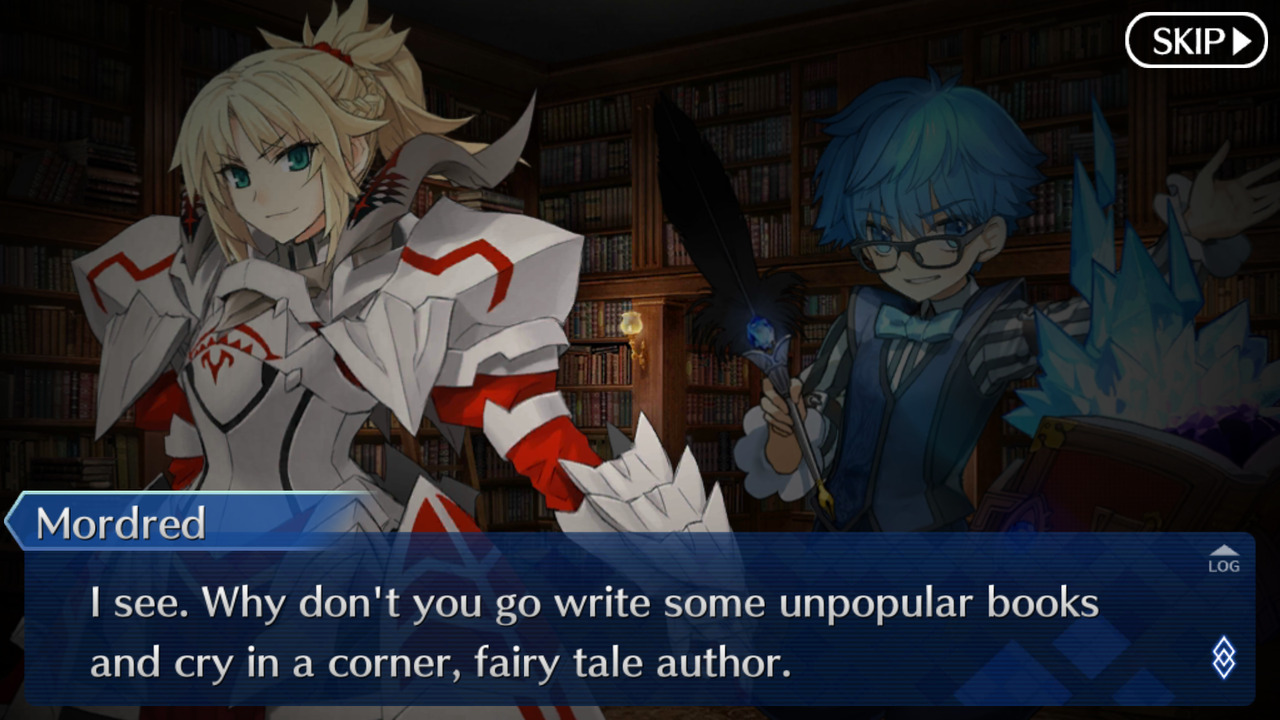Player InformationName: Jesse
Age: 24
Contact: ![[plurk.com profile]](https://plurk.com/favicon.ico) goatsong Other Characters:
goatsong Other Characters: N/A
Character InformationName: Hans Christian Andersen
Canon: Fate/Grand Order
Canon Point: Post Lostbelt 4
Age: Ageless; mentally 70, physically 10.
History: Fate/Extra CCC |
Fate/Grand OrderThere isn't an English summary for Andersen's role in CCC, so here are some quick bullet points:
In his past life, he was in love with a woman. This woman married a friend of his but was found a week later, dead. The incident caused him to swear off of ever loving a human again.
He was summoned as a Servant to Kiara Sessyoin, who was an avid reader of his fairy tales. Her plan was to hack the Moon Cell and, with Andersen's Noble Phantasm, seize control of the core to become God.
Andersen doesn't participate in the Grail War and spends most of his time hiding in the school. He freely offers advice to the protagonist and warns them to watch out for Kiara.
Over the course of the game, he falls in love with Kiara, which enables him to finish his Noble Phantasm in the True Ending. Kiara becomes one with the Moon Cell, but is ultimately defeated by the protagonist and their Servant. Her defeat spells his death, which he accepts after confessing to his fallen Master.
Personality: Listen to me. Authors are just fools who fled to the pen when reality wouldn't go their way. Do you really think I can help you with anything?
-Andersen, Fate/Grand Order
Sharp-tongued and cynical, Andersen's intensely pessimistic personality is a startling contrast to his fame as a fairy tale writer. When summoned by Fate/Grand Order's protagonist, he introduces himself as a "third-rate" who should be "thrown into the corner of a bookshelf." He's someone who openly declares his hatred for the world and for humanity, who sees society as mediocre. No one - not even kings or gods - are spared from his critical eye. If he sees faults in someone, he will expound on them at length, often working himself into dramatic speeches loaded with metaphors. All in all, he comes off as a self-centered, theatrical blowhard who especially exhibits a childish streak when prompted to do things he doesn't want to.
This isn't to say he's immune from his own criticisms. It's common for Andersen to refer to himself as useless. He possesses no wish for the Holy Grail because he's failed at attaining his dreams during his lifetime. And throughout Fate/Extra CCC, he confesses that he's a hypocrite who often says one thing while doing another. There's a passivity to Andersen where he accepts whatever fate comes his way, a tendency to resign himself to the worst-case scenario rather than to fight to make a change - because in his eyes, he can't do it alone. He's a weak Servant, someone skilled only in wordplay and little else.
Your speech is dull, but your eye for people is first-rate. I thought perhaps you were a mad dog begging for death, but your character is that of an adventurer who challenges despair. You put your life on the line to speak the truth. You put your soul in every reckless utterance. To you, to give up your words would mean the death of your soul. Compared to that, actual death is nothing to be feared.
-Gilgamesh, Fate/Extra CCC
Even so, there's a streak of pride that Andersen refuses to abandon. He sees it as his duty to tell the truth as he sees it and never lies when it comes to his opinion, even if it'd be better to water it down. Though he calls himself weak, he demonstrates unmatched loyalty in regards to his Master, declaring that he'd walk with them into hell, even if he doesn't agree with their goals or methods. To Andersen, his values are of utmost importance to him because of his role as an author. His purpose as a Servant is to record the stories of those around him. And to do that, he has to understand both himself and his subjects.
There's an interesting shift in Andersen's authorial responsibilities when we compare CCC with F/GO. He was summoned to Chaldea not as a participant of a doomed Holy Grail War, but as one of the many heroes called forth to defend mankind as a whole. This changes him from a passive observer - which he was in CCC - to an active participant of the story. He's become someone who
can make a difference in his Master's life despite his weaknesses, and the protagonist's struggles through the singularities inspires him to write a hopeful adventure story for children based on their life... something completely different from his usual gloomy fare.
But what about it?
I'm not searching for salvation from the get-go.
What I'm looking for is that resentment.
The voice that resents the end is truly the motivation for the writer of children's stories.
-Andersen, Fate/Grand Order
For all his grandstanding, Andersen's strange sense of pride twists how he expresses his feelings. He died with a letter from his childhood love because of this very same pride, and his struggles with it remain apparent in how he interacts with others. It's easier for him to speak of the negative than to praise the positive because it's what he understands best. In the CCC game materials, Andersen's sharp remarks aren't born out of a desire to scorn someone but come from a place of mutual understanding. Having been an extremely flawed man who's struggled so much, he finds it easier to see what's painful
because he's shared the experience, to an extent.
And what he hasn't gone through, he attempts to understand. Though Kiara wished to enslave mankind in a twisted Nirvana, Andersen attempts to learn
how she came to be such a monster. Even Goetia, the mastermind behind mankind's incineration, is treated with sympathy, with Andersen calling him "a monster without love, yet with more dreams than others." It's this effort to sympathize that's guided his approach to writing. Good and evil hold equal weight in his eyes - what he wants is to understand and thus reveal the true heart of his subject.
Incidentally, Hans Christian Andersen is nothing like that. He's not in love with his own work. Instead, he uses his work to express how he wishes the world was. You can see that in the affection he shows towards [Player.] He may hate the world, its people, and even himself, but he can't completely give up what love he still has.
-Da Vinci, Fate/Grand Order
Thus, we come to the very core of who Andersen is. Despite his cynicism and thorny pride, he is ultimately someone who is still in love with the world and its people. He's moved by the CCC protagonist taking the time to read his stories, to the point where he's willing to reveal his Noble Phantasm to them. He puts himself in harm's way to defend Mordred in the London singularity, despite having bickered endlessly with him. And he speaks of how he still believes in the power of love at the end of CCC, and how he believes people like the protagonist are capable of bringing about a brilliantly bright story. It's why he works so hard despite all his complaints about being overworked, for he's someone who can't turn a blind eye to someone in need. It's his nature to be helpful, regardless of who it is.
Andersen is a man worn by the horrors and ugliness he's seen in the world, yet refuses to give up on the good in humanity. He writes his stories for the sake of capturing the tales of the downtrodden and forgotten, the monstrous and outcast, so he can spur outrage for change. While he's given up on his own ability to change the world, his hope lies in those around him - and it's for those people he writes and works himself to the bone for.
Abilities & Skills: ☆
Heroic Spirit: Andersen is a familiar made of magical energy, or mana. He's anchored to the physical world by establishing a contract with a Master. He can shift into an intangible spirit form and cannot die unless his spiritual core, or Saint Graph, is destroyed.
☆
Item Creation: Andersen can create items from his fairy tales.
☆
Territory Creation: Andersen can create a small magical space which he can hide in that is undetectable to outsiders. It often takes the form of a study.
☆
High-Speed Incantation: Andersen can write faster than a college student hyped up on 10 Red Bulls with a thesis paper due before midnight.
☆
Human Observation: Essentially, high-level deduction. Andersen is able to intimately understand the personality of anyone he meets, even if he's just met them.
☆
Innocent Monster/The Mermaid Princess's Love: Andersen is affected by his readers' perception of who he is. This manifests on his physical person as a constant pain in his throat, burns along the sides of his arms, mermaid scales along his legs, and a fondness for tragedy.
☆
Noble Phantasm: A Noble Phantasm is a Servant's trump card. Andersen's is called Märchen Meines Lebens: A Story For You. It allows him to transform his subject into their ideal self. Its potential is powerful, as it can theoretically elevate the target into god-like being. The downside, however, is that Andersen has to 1) complete the work and 2) finish the work with a good ending. Because of the time and effort such an NP takes, its effects are usually limited to temporary buffs (ex. heals allies for a short period of time, briefly powers them up.)
Inventory/Companions:-Headphones
-Glasses
-Stupidly oversized lab coat
-Magically powered iPad expy
-Leather-bound book
Choice: Witch.
Reason: Andersen sees himself as a sort of monster already, the sort that places storytelling above all else. He's also suffered some body horror already in canon, so I think it'd be more interesting for him to oversee someone who's turning into a monster and how he'd guide them!
Sample: TDM top level! | September 2019 



